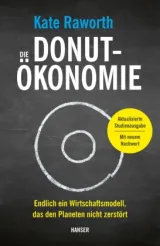Kate Raworth sagt, es sei höchste Zeit, die Wirtschaft des 21. Jahrhunderts umzugestalten und gerechter zu machen. Sie schlägt ein fantasievolles, donutförmiges Wirtschaftsmodell vor, das die Grundbedürfnisse der Menschheit mit den ökologischen Grenzen des Planeten in Einklang bringt.
Kate ist eine renommierte Ökonomin und Autorin des Buches „Doughnut Economics: Seven Ways to Think Like a 21st-Century Economist” (Donut-Ökonomie: Sieben Wege, wie man wie ein Ökonom des 21. Jahrhunderts denkt). Im Gespräch mit The InnerView erklärt sie, warum andere sich Amsterdam, Brüssel und Kopenhagen anschließen und ihr innovatives Konzept übernehmen sollten, und wie das einseitige Streben nach Wachstum viele Menschen zurückgelassen hat.
Kate Raworth says it is high time to reshape the economy of the 21st century to a more equal one. She proposes an imaginative doughnut-shaped economic model that balances humanity's fundamental needs with the planet's ecological limits.
Kate is a renowned economist and the author of "Doughnut Economics: Seven Ways to Think Like a 21st-Century Economist". She speaks to The InnerView about why others should join Amsterdam, Brussels, and Copenhagen in using her innovative concept, and how a single-minded pursuit of growth has left many people behind.
Inhalt
00:00 Intro
01:24 What is the price of endless economic growth?
03:30 What is ‘doughnut economics”?
05:50 On the current state of "the global doughnut"
08:42 How divisions on economics hampers our response
11:17 Which nations are within the doughnut model?
13:21 Do we need to replace GDP as a metric?
14:58 On Costa Rica being among the “richest” countries in the world
15:56 America’s place in the "D20" 16:58 Is there any space for billionaires in Kate’s concept?
18:40 Doughnut enterprise design traits
20:56 What challenges did Kate encounter over the past years?
22:37 Future leaders and changemakers

